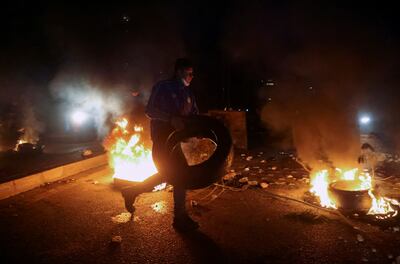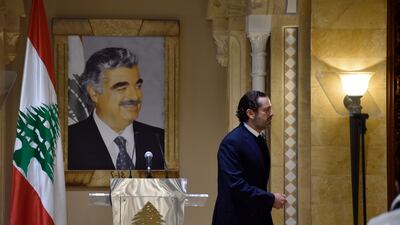The spectacular withdrawal of former prime minister Saad Hariri from politics on Monday has left his political party in disarray, with MPs uncertain of their future and fearing growing division just five months away from parliamentary elections.
“We’re a bit lost, let’s see what the next couple of days bring,” MP Sami Fatfat from the Future Movement told The National. “It’s a blow.”
MP Mohammad Hajjar said that he feared that the party’s enemies, including Iran-backed Hezbollah, would gain more ground. “I’m worried about my people and my region. Who could replace me?” he asked. “I think there will be massive abstention among the Sunni population.”
Mr Hariri’s withdrawal creates a void in Lebanese political life, which is governed along complex sectarian lines. The Future Movement, which will not participate in the May 15 parliamentary elections following Mr Hariri’s speech, represented most of the country’s Sunni Muslims.
a former parliamentarian and senior member of the Future Movement party
The post of prime minister is always held by a Sunni Muslim, while the presidency goes to a Maronite Christian, and the Parliament Speaker is a Shiite Muslim.
A three-time prime minister, Mr Hariri is the political heir of his late father Rafik, a billionaire who was assassinated in 2005.
But his businesses have faced turmoil in the past years, starting with the closure of the family construction firm in Saudi Arabia in 2017. He recognised this in his speech on Monday, saying that he had suffered personal financial losses and lost friendships due to political compromises.
Mr Hariri has shown growing frustration with local politics in recent years and announced in July that he had given up trying to form a Cabinet after he was appointed prime minister in October 2020. At the time, he blamed President Michel Aoun, who shifted the blame back on Mr Hariri. He had previously resigned in the face of mass anti-government protests in late 2019.
'We had no impact'
Political infighting has worsened Lebanon’s financial crisis, which has pushed more than three quarters of the population into poverty.
“I cannot stand […] that some Lebanese consider me as a pillar of this regime that is responsible for this catastrophe,” Mr Hariri said in his speech on Monday.
In a tweet, Lebanon’s Prime Minister Najib Mikati described Mr Hariri’s withdrawal as a “sad page” for the country but that he understood his “bitterness”. “The homeland will unite us and moderation is our path,” he said.
Mustafa Allouche, a former parliamentarian and senior member of the Future Movement party, told The National that the Future Movement could not continue being a “Sunni cover” for Hezbollah’s actions, which he blamed for the country's woes. The Shiite Muslim party is allied to President Aoun.
“We had no impact” while in power, he said.
He was unsure of what will come next. “It’ll be a soup of everything,” he said. “Anyone who tries to find a reason to run in the elections and was part of the Future Movement is just a hypocrite now.”

Mr Allouche said that he and Mr Hariri had lost hope in Lebanon’s future. “We might see the disintegration of the country through war or just withering away,” he said.
Though some party members like Mr Hajjar said that Mr Hariri’s withdrawal was temporary, Lebanese political analyst Imad Salamey believes that he has quit for good. He described his move as “both good and bad”.
“It’s natural for political leaders who lose on the ground because of miscalculations or electoral outcomes to give their post to others,” he said.
The Future Movement appeared the main loser in the 2018 legislative elections, when it lost around a third of its seats.
But the party's absence this year may also encourage conflicts because of the nature of Lebanon’s sectarian politics. “There isn’t much alternative among the Sunnis, which will create a power gap and instability,” said Mr Salamey.
“It can add to the sense of deprivation within the Sunni community and that can feed into extremism.”
Former prime minister Tammam Salam, who said last week he would not run in the May elections, wrote on Twitter on Monday that Mr Hariri’s decision reflected “deep political imbalances”.
In what looked like a reference to the Future Movement’s rivals such as Mr Aoun, he added that it could be a lesson “to those who consider themselves victorious today over the remains of the collapsed homeland”.

























